Julio Gone is a film of genre Drama with Lília Cabral
Julio Gone (2014)
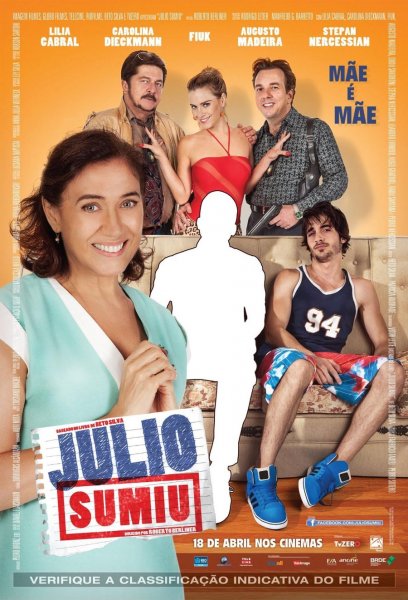
If you like this film, let us know!
Julio Sumiu is a 2014 Brazilian comedy film directed by Roberto Berliner based on the novel of the same name by Beto Silva.
^ http://www.adorocinema.com/filmes/filme-218413/curiosidades/
Actors

Lília Cabral
(Edna)

Carolina Dieckmann
(Mada)

Leandro Firmino
(Tião Demônio)

Fiuk
(Silvio)

Babu Santana
(Orlando Caolha)

Stepan Nercessian
(Barriga)
Comments
Leave comment :
Suggestions of similar film to Julio Gone
There are 17 films with the same actors, 90581 with the same cinematographic genres (including 1069 with exactly the same 3 genres than Julio Gone), to have finally 70 suggestions of similar films.If you liked Julio Gone, you will probably like those similar films :
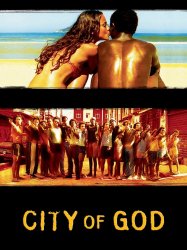
City of God (2002)
, 2h10Directed by Kátia Lund, Fernando Meirelles
Origin Bresil
Genres Drama, Action, Crime
Themes Medical-themed films, Films about music and musicians, Films about drugs, Hip hop films, Gangster films
Actors Alexandre Rodrigues, Alice Braga, Jonathan Haagensen, Leandro Firmino, Seu Jorge, Douglas Silva
Rating85%





In the opening scene, chickens are being prepared for a meal when a chicken escapes and an armed gang chases after it in a favela called the Cidade de Deus ("City of God"). The chicken stops between the gang and a young man named Rocket (Buscapé), who believes that the gang wants to kill him. A flashback traces Rocket, the narrator, back to the late 1960s. He lived incredibly poor in this slum of Rio.

The Best Things in the World (2010)
, 1h45Directed by Laís Bodanzky
Origin Bresil
Genres Drama, Comedy, Romance
Actors Caio Blat, Denise Fraga, Fiuk
Rating71%





The film is set in a middle-class school in São Paulo, and tells the one-month period in the life of Hermano, "Mano". Mano and his brother Pedro lead fun-loving lives until they learn their parents are getting a divorce. The anguish of their parents’ separation becomes more difficult when they discover their father is gay. Deeply affected by the changes at home, Mano must also deal with the challenge of being popular at school, having sex for the first time, the discovery of love and a snooping classmate’s destructive gossip blog. The arrival of adulthood brings with it overwhelming difficulties and a major transformation in the way Mano sees the world.

Posthumous Memories (2001)
, 1h42Origin Bresil
Genres Drama, Comedy, Comedy-drama
Actors Reginaldo Faria, Petrônio Gontijo, Viétia Zangrandi, Sônia Braga, Marcos Caruso, Stepan Nercessian
Rating68%






Totally Innocent (2012)
, 1h30Origin Bresil
Genres Comedy, Crime
Actors Fábio Porchat, Fábio Assunção, Leandro Firmino, Mariana Rios, Fábio Lago, Vivianne Pasmanter
Rating33%





The community of the DDC is at war. The Branquelo do Morro and the Diaba Loira shemale are vying for power in the community. Oblivious to this, Da Fé believes he needs to become the boss of the hill to conquer the love of Gildinha. Everything gets worse when the reporter Vanderlei forges a cover.
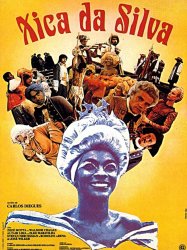
Xica (1976)
, 1h47Directed by Carlos Diegues
Origin Bresil
Genres Drama, Comedy, Historical
Actors José Wilker, Walmor Chagas, Rodolfo Arena, Stepan Nercessian, Tony Ferreira
Rating69%





The film is based on the novel Memórias do Distrito de Diamantina, written by João Felicio dos Santos (who has a small role in the film as a Roman Catholic pastor). It is a romanticized retelling of the true story of Chica da Silva, an 18th-century African slave in the state of Minas Gerais, who attracts the attention of João Fernandes de Oliveira, a Portuguese sent by Lisbon with the Crown's exclusive contract for mining diamonds, and eventually becomes his lover. He quickly asserts control, letting the intendant and other authorities know that he's onto their corruption scheme. Eventually Lisbon hears of João's excesses and sends an inspector. José, a political radical, provides Xica refuge.
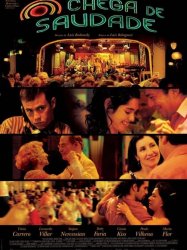
The Ballroom (2007)
, 1h32Directed by Laís Bodanzky
Origin Bresil
Genres Drama, Comedy, Musical, Romance
Actors Leonardo Villard, Maria Antonieta de Farias Portocarrero, Cássia Kis, Betty Faria, Stepan Nercessian, Maria Flor
Rating70%





 , 1h40
, 1h40Origin Bresil
Genres Drama, Comedy
Themes Cooking films
Actors João Miguel, Babu Santana, Fabíula Nascimento, Jean-Pierre Noher, Paulo Miklos
Rating77%





The film shows in parallel two periods in the life of Raimundo Nonato (João Miguel): one follows his successful career as a cook, the other as a prisoner in a cell with about ten other convicts. It gradually becomes clear that these events happen after the former.

Between Us (2013)
, 1h40Directed by Paulo Morelli
Origin Bresil
Genres Drama
Actors Caio Blat, Carolina Dieckmann, Maria Ribeiro
Rating70%





Seven young writers friends traveling to a farmhouse to celebrate the publication of the first book of the group. There, they write letters to be opened ten years later. The trip ends in tragedy after the death of one of the friends. Even then, they meet ten years later to read the letters.

Tim Maia (2014)
Origin Bresil
Genres Drama, Biography, Documentary, Historical, Musical
Themes Films about music and musicians, Musical films
Actors Alinne Moraes, Cauã Reymond, Babu Santana, Ephraim Benton, Denise Dumont, John Ventimiglia
Rating71%





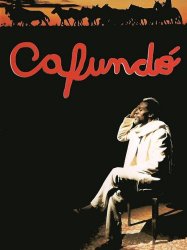
Cafundó (2005)
, 1h42Directed by Paulo Betti
Origin Bresil
Genres Drama, War, Biography, Documentary, Historical
Themes Films about slavery, Films about racism, Films about religion
Actors Lázaro Ramos, Leona Cavalli, Leandro Firmino, Alexandre Rodrigues, Luís Melo, Francisco Cuoco
Rating62%





São Paulo state, 1890s. João (Lázaro Ramos) is a former slave and the son of an Orisha priestess and works as a muleherd for a coronel. One day, he and his close friend Cirino (Leandro Firmino da Hora) decide to leave the farm. João takes his mother to Cafundó, the bastion of Afro-American religion in the vicinity. However, João leaves the community and takes errands to work in menial jobs. He meets a possessed white prostitute named Rosário (Leona Cavalli) and falls in love. Only after an unhappy marriage with Rosário and his mother's demise, João has a series of visions and decides to work as a spiritual leader for Sorocaba. In 1906, he builds a church with help from Cirino and begins to preach his syncretic faith, which is a blend of Orisha worship, veneration of Catholic saints, and eventually Kardecist spiritism.
 Connection
Connection